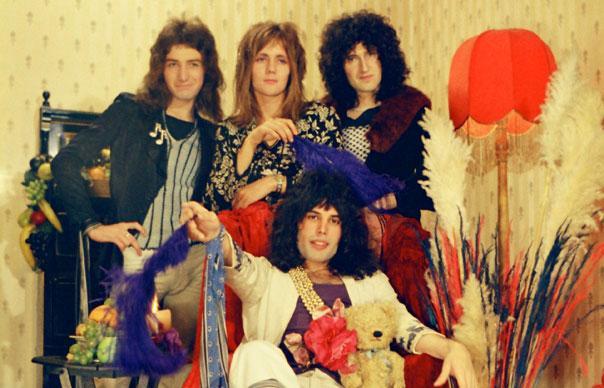As the four players ran to their cars en route to a soundcheck on the first afternoon, young fans chased them through the Sheraton Hotel lobby, blocking their exit, roaring after their cars on motorcycles in scenes more reminiscent of the top teeny bands than appropriate for senior rock citizens. But Queen loved every minute. Fresh from a Japanese tour in which they had been similarly welcomed, followed by a short holiday break, Queen were in splendid shape, their performance not in the least jaded from years of road work.
The gladiatorial atmosphere of an important concert was fuelled by the nationalistic opening announcement of the promoter: “Argentin-A. Argentin-A!” the crowd screamed back, 35,000 voices at once, and the playing of the World Cup anthem gave the show a great start. Helicopters circled the stage, the crowd went bananas and thousands lit candles or lighters to make a glittering sight before, during and after a dramatic few moments of darkness, we were off, with explosives and dry ice enveloping the stage in a cascade of brilliant colours to herald the arrival of Queen.
Mercury was resplendent in red trousers, and the roar would have shaken Wembley on Cup Final Day. The floodlit green turf and massed thousands cheering every note added to the infectious, carnival feeling on both nights.
Their programme varied for the Buenos Aires concerts, as did their dress: Mercury was in pristine white slacks for the second night. He made a noble stab at speaking Spanish, but considering the language barrier in the music, the locals recognised nearly everything and had no problem in chanting along to “Save Me”, as well as engaging in that trad rock-star-to-audience banter as Freddie went into his “All——righhhhhhht” routine and demanded they repeated the words back. They enjoyed, too, his moments of madness when he showered the first few rows, then himself, with beer from his can.
The music: Mercury has a unique grip on his audience, plus a voice of considerable power. His acrobatics inspired the crowd to a frenzy. The instrumental lynchpin for Queen is Brian May, who, along with Jethro Tull’s Martin Barre, is one of the great unsung heroes of British rock guitar. Both melodic and macho, May gives Queen a distinctive touch and individuality which stamps their sound. He is no innovator, but a solid technician who knows his instruments and forms the backbone of Queen’s songs.
“Rock,” May said to me, “is now going precisely like jazz did – jazz began as a body of music then became intellectual. I think that’s a danger for rock. It needs to remain body music first, and I’m very conscious of the fact that Queen must not get too cerebral.” They have perfected a brand of rock and showmanship that’s lyrically and melodically accessible.
Because of the surge of interest in Queen over the last year, audiences recognised nearly every song after the first few bars. “The Game” drew first blood as a direct hit, with Mercury’s piano solo particularly eloquent, and May’s guitar solo limpid and dreamy.
The shows were paced so that the crowd was not deprived of hits in the early segment: “Killer Queen” came early, as did “Save Me”, which evoked waves of emotions as thousands of voices joined in the hymnal chant along with the band. At this point, the game was up and the night won, Queen cruising into the hearts of deliriously happy crowds as “Love Of My Life” brought the same singalong brotherhood, Brian May telling the crowd: “This is for you, Argentina.”
On and on, through “Crazy Little Thing Called Love”, and Freddie at the piano for “Bohemian Rhapsody” – their best song, sounding perfectly fresh although they’d played it hundreds of times. During “Rhapsody”, they left the stage and let the tapes make a good job of the orchestral portion.
“Fred—ddie,” “Fred—ddie!” the crowd chanted. The tribal cry continued ’til Queen returned for an encore, Mercury stripped to the waist and wearing shorts on one night, the next wearing a crown before lunging into “Another One Bites The Dust” and the second encore, “We Are The Champions”.
Exit, finally, to “God Save The Queen”. Yes, the national anthem. Margaret Thatcher would have been proud of them. It was, of course, all well and truly over the top, exaggeration for the sake of emphasis, a combination of Gucci and Harrods rock. But the most hardened of cynics would have to hand it to Queen: what they set out to do, they achieve with verve, and it succeeds through the sheer weight and spectacle, and strong music.
One of their party had said, in typical Queenspeak before the first show in Buenos Aires: “They are attempting to scale Everest here and they have everything to lose and nothing to gain. If it’s a successful tour, rock people around the world will say South America was about to open up anyway. If they fail, people will say: we told you so.”
Pioneers of a significant revolution or diehard opportunists – what matters more is that Queen did it. Clinical and machine-like they may be in their approach, but that’s inevitable for a band at their level. It’s pure rock theatre, with none of the arrogance or negativity of Pink Floyd, who might have been expected to outstrip the rest of the world in South America.
Next stop, China?
Uncut: the spiritual home of great rock music.



